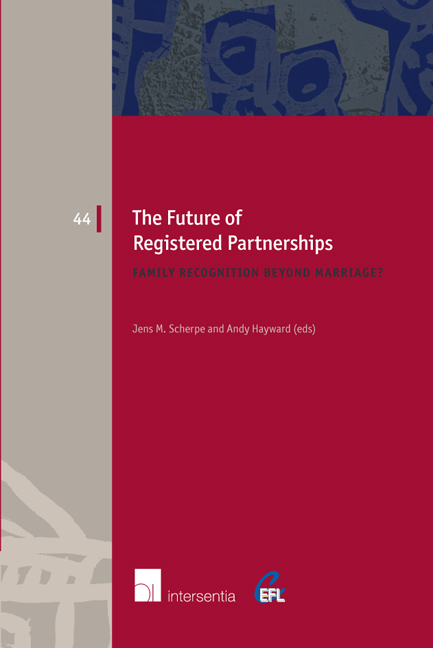Book contents
- Frontmatter
- Foreword
- Preface
- Contents
- List of Contributors
- The Future of Registered Partnerships: An Introduction
- Questionnaire
- Part I Registered Partnerships as a Functional Equivalent to Marriage
- Part II Registered Partnerships as an Alternative to Marriage
- Part III Registered Partnerships in a Time of Transition
- Registered Partnerships in England and Wales
- Registered Partnerships in Scotland
- Registered Partnerships in Northern Ireland
- Registered Partnerships in the Republic of Ireland
- Registered Partnerships in Greece and Cyprus
- Part IV Alternative Models for Registered Partnerships: Beyond Conjugality, Beyond Formality
- Part V Registered Partnerships, Discrimination and Human Rights
- Part VI Comparative Perspective and Conclusions
- Index
- European Family Law Series
Registered Partnerships in Scotland
from Part III - Registered Partnerships in a Time of Transition
Published online by Cambridge University Press: 22 September 2018
- Frontmatter
- Foreword
- Preface
- Contents
- List of Contributors
- The Future of Registered Partnerships: An Introduction
- Questionnaire
- Part I Registered Partnerships as a Functional Equivalent to Marriage
- Part II Registered Partnerships as an Alternative to Marriage
- Part III Registered Partnerships in a Time of Transition
- Registered Partnerships in England and Wales
- Registered Partnerships in Scotland
- Registered Partnerships in Northern Ireland
- Registered Partnerships in the Republic of Ireland
- Registered Partnerships in Greece and Cyprus
- Part IV Alternative Models for Registered Partnerships: Beyond Conjugality, Beyond Formality
- Part V Registered Partnerships, Discrimination and Human Rights
- Part VI Comparative Perspective and Conclusions
- Index
- European Family Law Series
Summary
HISTORY AND BACKGROUND
INTRODUCTION
Scots law recognises and provides legal consequences for three distinct, if overlapping, forms of conjugal relationships: marriage, civil partnership (the term for non-marital but registered partnership), and cohabitation (that is to say, unregistered domestic partnership). Marriage and civil partnership have substantially similar consequences; cohabitation has far fewer, indicating a continued politico-legal preference for registered relationships; only civil partnership is (at the moment) gender-specific in that it may be entered into only by same-sex couples.
Marriage
Prior to the Reformation the rules of marriage in Scotland were determined by the Canon law of the Roman Catholic Church, and in 1560, when the authority in Scotland of the Pope was abolished, these rules remained in force, except insofar as they were inconsistent with the reformed faith. The immediate effect of that qualification was to reintroduce judicial divorce (on the biblical ground of adultery). A special Commissary Court took over the role of the now-abolished church courts to determine matrimonial matters (and was subsequently absorbed into the civil courts). Getting married remained a religious process exclusively controlled by the presbyterian Church of Scotland (with certain episcopalian (Anglican) ministers being by concession permitted to marry couples) until the Marriage (Scotland) Act 1834, which allowed priests or ministers from other churches to celebrate marriages. Registration of marriages was introduced by the Registration of Births, Deaths and Marriages (Scotland) Act 1854. Civil celebration was presaged by the Marriage Notice (Scotland) Act 1878, which allowed notice to the registrar to replace the calling of banns, but it was not until the Marriage (Scotland) Act 1939 that civil ceremony was permitted to create marriage. Formally entering into marriage was not, however, the only method of creating marriage, and Scots law clung on to ‘irregular marriages’ far longer than most other European countries. Irregular marriage was a doctrine of the Canon law, whereby parties – if they were free to marry each other – could become married by behaviour other than a formal ceremony and thus marriage was possible without any involvement from either religious or state authorities. This form of marriage creation was abolished in the Roman Catholic Church by the 1563 Council of Trent, but by then the Scottish Reformation had taken place and so the Roman Catholic Church's deliberations at Trent had no effect in Scotland.
- Type
- Chapter
- Information
- The Future of Registered PartnershipsFamily Recognition Beyond Marriage?, pp. 225 - 252Publisher: IntersentiaPrint publication year: 2017



